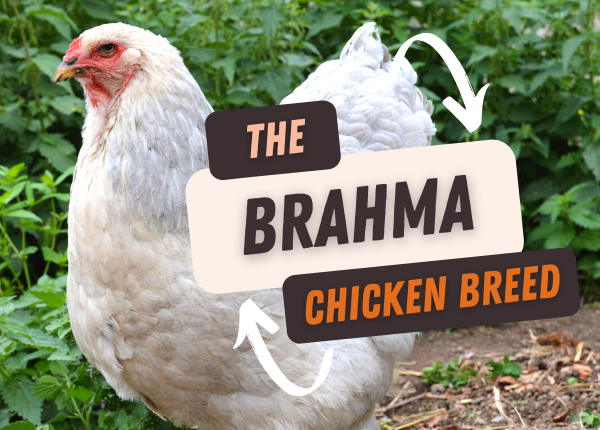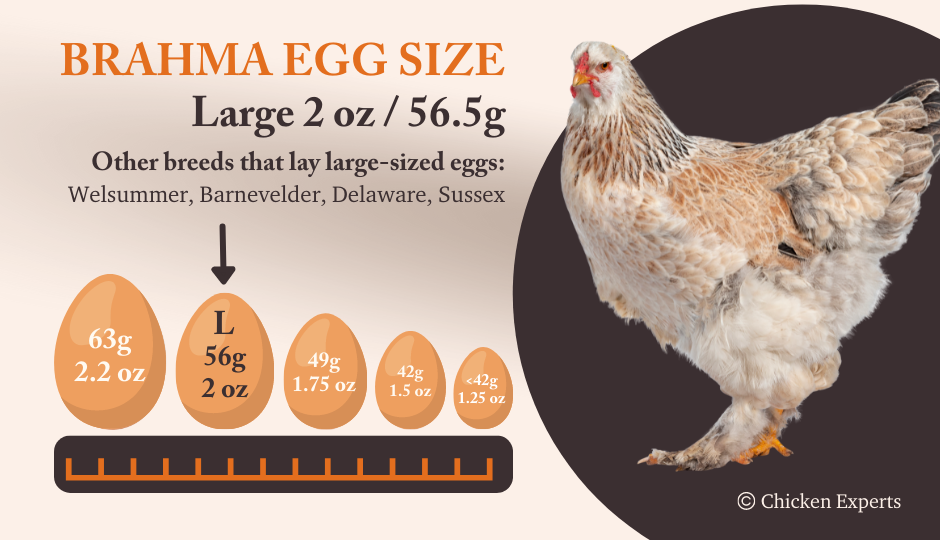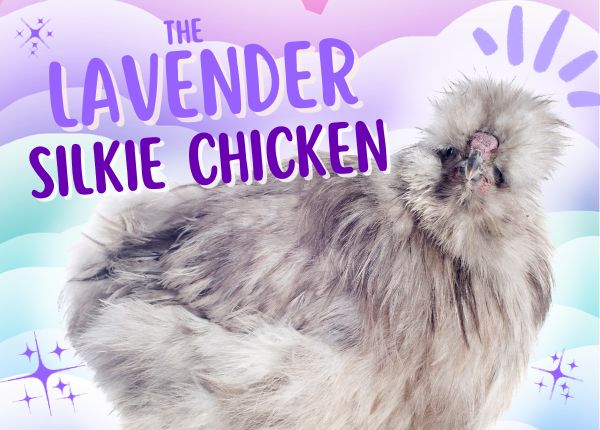
When size does matter! The Brahma is the second largest chicken breed; yet it only lays regular size eggs, meaning bigger doesn’t always mean best. Keepers share this and more about why they love Brahma hens, despite laying 45% less eggs than your prolific egg layers.
Do you want to own a super friendly, hearty, and good-laying chicken breed, that are also beautiful and comment-worthy animals? If you do, the Brahma chicken is for you!
It seems 88% of Brahma owners would agree, but more on that later!
If you love chickens, you might also know that the Brahma chicken is one of the largest breeds of chicken second only to the Jersey Giant. This is a valuable chicken variety to add to your flock if you want beautiful chickens and access to quality egg-laying hens as well. Brahma chickens are friendly and really enjoyable to own for a whole variety of reasons.
If you want to know more about how to care for the Brahma chicken breed, and how their size compares with our breeds, then you need to read on because we have some great comparisons for you!
What you can expect to learn from this article:
- Top reasons to pick this breed
- Brahma chicken size comparisons
- Brahma egg size comparisons
- Characteristics of this unique breed
- Caring for your Brahma chickens
Why We Love the Brahma Chicken Breed
If you have been thinking about getting Brahma chickens for your backyard, you probably need to know what they can offer you. This is a breed that has a lot to recommend it!
|
Brahma Chicken Fast Facts |
|
|
Hen Size |
X-Large (8 lbs. /128 oz.) |
|
Bantam hen size |
2 lbs. / 34 oz. |
|
Purpose |
Dual |
|
Origin |
China |
|
Rarity |
Common(Fairly rare) |
|
Color varieties |
Dark, Light, Buff,Gold |
|
Avg. Egg Yield |
150 yearor 3-4 per week |
|
Egg Color |
Medium brown |
|
Egg Size |
Large - 56g |
|
Lifespan |
(5 to 8 years) |
|
Temperament |
Calm, friendly, gentle |
|
Climate Suitability |
Hot & cold hardy |
|
Age of maturity |
7 months |

-
Great Egg Layer
Brahma hens will not let you down on the egg front. We asked 100 Brahma parents what to egg-spect from these luscious ladies, and the results were reassuring. 44 owners said they get 4 eggs a week, and 37 said it was more likely to be 3 eggs. A very clucky 13 owners were scooping up five fresh eggs a week!

On average, how many eggs do your Brahma hens lay per week?
-
Docile and easy to care for
This breed is very nice to handle, and they do not take a lot of extra care. You do not need to have lots of chicken husbandry experience to care for these hens with ease.
-
Appearance
Many people love the massive size of these hens and their beautiful colors. These hens come in dark, light,gold, and buff colors. They are also fluffy and feathery and very appealing no matter what color of hen you select.


-
Large Egg Size
Brahma eggs are about 2 oz in most cases. These are considered large eggs, and there are few chicken varieties that can promise this size egg.
-
Large Hen Size
The Brahma chicken averages about 18 inches high. They weigh around 8 to 10 lbs. This is an impressive bird and one that you will enjoy having around. These are birds that are noticeable and impressive as well as beautiful.

-
Affordable
This breed is very affordable. Chicks cost about $5. Older birds only cost about $25. This is a really great price for food-production animals that produce this well.
Brahma chicken size comparisons
When size does matter, you’re probably looking for a hen that lays the largest eggs, most frequently, and understandingly looking for the largest size makes hen sense! But this o’l girl will certainly give you consistency in laying large eggs, but she will give you around 45% less than your most prolific layers like the leghorn and Sussex. As you can see in the table below, we have compared some of your most common girls, the little Silkie Bantam and an Isa Brown, and as you can see the Braham girl is 170% larger than a silkie in weight and around 75% larger than an Isa Brown.

Whilst Brahma roosters are known to stand up to 30 inches tall (wowzers) and hens are thought to stand at around 18 inches fully grown, we like some real-world truths at ChickenExperts.
So, we tapped into some real experiences from our own egg-spert community!
This absolute beauty is big Bertha - gorgeous Brahma baby of chicken momma, Debby.

Bertha is standing pretty here in front of a 5 gallon bucket. She’s only 9 months old, and already a sizeable 19 inches tall! Brahmas carry on growing until they’re 18 months old, so she still has some height gain ahead of her too. The lesson here - they’re slow growers but they get bigger than you might think!😍
Whilst Brahma Roosters are undeniably big boys, the 30 inch beefcake you see on the charts is at the top end of the scale. Debby’s roosters all measure between 19 and 23 inches tall, fully grown.

After Debby hatched her first Brahma chickens she was a convert, and she’s just become the proud mummy of even more Brahma babies 🐣. Check out these stupidly-cute Lavender Lace, Buff Lace and Blue Lace Red fluff bombs. Congrats, Debby!

“I love watching them grow and get more confidence in that first week of life, they get brave fast. Most are calm and laid back if they've been raised right, and most of the time they’re giant babies!” (Jd Ledford ,GA, USA)
Comparison Between Brahma Chicken and Other Breeds
The Brahma chicken is about 66% bigger than your average backyard chicken breed. Most chicken breeds are about 5-8 pounds. The modernBrahma chicken is 10 pounds in size. The Brahma often lives for about eight years, while other chicken breeds live for about 3-7 years.

Photo Credit: @homegrownhawley via Instagram
Brahma egg size comparison
This breed takes about seven months to reach egg-laying maturity, which is longer than many other breeds. They also do not lay as many eggs a week as breeds such as the Sussex or a Leghorn but their eggs 🥚 are classified as large. If you want those extra-large golden beauties, then have a look at the Leghorn or the Jersey Giant.

Brahma roosters are very docile when compared to other chicken breeds. This can make them a great choice if you have kids living with you or other animals that might have issues with the protectiveness of some roosters.
Characteristics of this unique breed
This breed is known for being hot and cold hardy and for laying150 eggs a year, 3-4 each week. Perhaps the most notable feature of this breed is its large size & temperament, and its feathery feet and beautiful colors are another. This is a really nice chicken breed to select if you want docile chickens that are easy to keep and that will live for about 8 years or so.
While not as good a choice for rapid egg-laying as some other breeds, you will get plenty of eggs from these hens.
Would you choose to own a Brahma chicken breed again?
Caring for Brahma Chickens
We think that caring for Brahma chickens is actually quite easy. They are very hardy birds, and they can lay eggs for many years.From a recent survey that we conducted with Brahma chicken owners,44% said that their chickens laid four eggs a week.
Brahma chickens have feathers on their feet, which can lead to issues in snowy or wet climates. Wet feet can lead to bumblefoot and other issues that are not a problem for other chicken varieties. You will also need to be aware that their long quill feathers can be prone to snags which can lead to pulled-out feathers.

Photo Credit: @homegrownhawley via Instagram
Being a large chicken, they will need a large area to roam in, and your chicken house will need to be built to hold the weight of a larger bird. Since they are very poor fliers, you will not have trouble keeping them in coops, even if you have low fences. You should only need a 3-foot fence to keep them contained with ease.
This is a chicken breed that eats a lot, so you will need to plan on free-feeding them about a third of a pound of feed each day. They do like foraging for worms and insects, but commercial feed should be provided to them in large quantities each day. The feed that you choose needs to contain about 16-18% proteins.
Make sure that your perches are about 12-18 inches in height. If you make their perches any higher, they might not be able to reach them. Your coop will need about 12-14 feet of space per chicken as well. Provide your chickens with sand, stone, or dirt floors to prevent foot issues.
Brahma Chickens Are an Excellent Choice
This is a really good chicken breed to pick if you want to have access toegg-laying benefits. They also make really docile pets and are beautiful to look at. No matter which color of Brahma you choose for your backyard, you will have a great experience with them.

If you need access to more information about caring for your Brahma chickens or you want to learn more about chicken feeding and topics like coop-building, you need to check out our courses!












Leave a comment (all fields required)